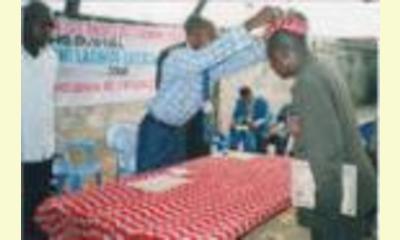|
|
Our Actions for a Culture of Peace in the Democratic Republic of the Congo
un article par MEDARD DU ROHER-BOPE, President, JFDHOP
The year 2011 is an election year for the Democratic Republic of the Congo (DRC). The DRC is in a post-conflict situation and its conflicts (wars) have caused great suffering, especially violence against women. Once again this year, our organization "Youth and Women for Human Rights and Peace" (JFDHOP) has undertaken numerous initiatives concerning the elections and respect for the rights of women. 
Here are some of the actions that we have undertaken this year, based on our experience gained in programs of the United Nations Decade for a Culture of Peace and Non-violence for the Children of the World (2001-2010).
In January our organization joined up with the National Coalition of Education for All (CONCEPT), a national network to promote the World Education Campaign, and we took part in a meeting of electoral observers organized by the Carter Center of the DRC.
In February, we took part in the work of case studies organized by the The Inter-Agency Network for Education in Emergencies (INEE).
Beginning in March, we have worked with the sub-commissions of UNICEF on the theme of violence against women, and with UNDP on "Gender and Elections".
In April, our organization participated in an workshop organized by the Carter Center with the theme of "All for a Peaceful Election."
From May until the present time, we have been working as observers and trainers on the revision of the election rolls.
Our organization has continued working to promote sensitivity about sexual violence since the beginning of the year. In this regard, we participate regularly in the legal sub-commisions at the Centre Bethanie of the Commune of Gombe organized by MONUSCO (the United Nations Organization Stabilization Mission in the Democratic Republic of the Congo).
(Click here for a French version of this article)
|








|
DISCUSSION
Question(s) liée(s) à cet article:
Can you add to this analysis of the Democratic Republic of the Congo?,
* * * * *
Commentaire le plus récent:
Evolution of the Peace Process in the Democratic Republic of Congo
submitted to CPNN in French by Solidarité avec les Victimes et pour la Paix and translated into English by CPNN
For the original article in French, see RDC Solidarite.
From the recent past to today
After the armed hostilities in 1996 and the fall of Mobutu in May 17, 1997, there was a period of relative calm for fourteen months. A new rebellion began on August 2, 1998. Very early, negotiations started in Lusaka (Zambia) and arrived at the first agreements of ceasefire dated from July 10, 1999. It was to oversee respect of these agreements of Lusaka that the Security Council of the United Nations set up its resolution creating the Observation Mission of the United Nations (MONUC).
It was in October 2006 that the first free elections were organized.
To establish an account of the situation is difficult, but it is easier to say that at the present time the effects of armed conflict are still sad at various levels. There is extreme poverty in the civilian population. Until the present a responsible solution has not been found to assure access of children to education.
Good news today is that the country now has a Constitution, a President of the Republic, a Parliament and a Senate and provincial assemblies as well as provincial governments following the democratic elections organized in 2007. In general, the Democratic Republic of Congo is arriving slowly at peace and stability despite the constraints of reconstruction and restoration of a state of law.
Without pretending to be exhaustive, this report is a description of human rights violations on the civilian population in the city of Kinshasa. Acts of torture continue to take place. . ... continuation.

|
|








